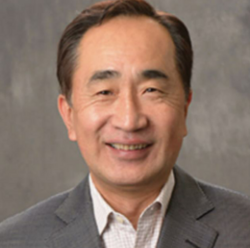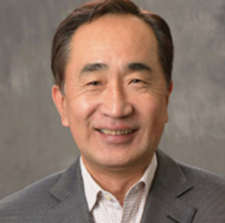Kobanashi Online Workshop for Teachers
—How to Instruct Students in Kobanashi Performance—
日本語のご案内は下にございます
Yale University’s Japanese Language Program is pleased to welcome Professor Hatasa Kazumi (Purdue University) to present a workshop on instructing learners in oral performance activities using kobanashi.
The goal of this workshop is for participants to experience practicing, performing, and receiving feedback of their own kobanashi, and therefore discover elements in their performance that can be practically applied towards language instruction of their own students. We especially welcome those who want to incorporate “kobanashi” into their class and/or curriculum. This workshop will be conducted in Japanese.
What is kobanashi(小噺)?
Kobanashi is a Japanese traditional verbal art (short jokes) designed to warm up the audience ahead of rakugo performances. Similar to rakugo, kobanashi crafts brief and amusing stories with punchlines, evoking the spirit of “dad jokes” through concise comedic anecdotes.
|
Time and Date |
Saturday, May 11, 2024 | 7:00 pm – 9:30 pm U.S. Eastern Standard Time |
|
Location and Access |
Zoom After application receipt, access information will be sent to the email used to register. |
|
Fee |
None |
|
Target Audience |
Japanese language teachers affiliated with North American educational institutions. Others motivated to incorporate “kobanashi” performance instruction into their Japanese language activities |
|
Requirements |
Participants that acknowledge the content in “Kobanashi Project for Everyone”, and those who are able to proactively engage with requirements 1-3 below. (After your application is received, details of the topics will be sent by email. The requirements will take between 2 and 2 ½ hours to complete.)
|
|
Participant Limit |
15 people (first come first serve; after reaching 15, registration will be closed.) |
|
Application |
Registration is closed. Prior to this workshop, we will welcome any questions you may have. |
|
Registration deadline |
Friday, April 5, 2024 |
|
Instructor |
Professor Kazumi Hatasa, Languages and Literatures Department, Purdue University, Indiana |
Aside from the above, we will also accept those who do not complete the requirements above and prefer to observe the workshop. Those who would like to just observe, please choose “I will participate without completing the requirements.”
Guest Speaker: Hatasa Kazumi. Graduated from Waseda University, Commercial Science Department. PhD received from Illinois University, in Educational Psychology in 1989. Beginning in 1983, worked in Japanese language education at Illinois University, Purdue University, Monash University, Middlebury University Japanese Language School, among others. From 2005 to 2018, served as headteacher at Middlebury University Japanese language school. Hatasa’s area of expertise is Japanese language education and utilizing technology in foreign language education. In 2020, received an award of official commendation from the Japanese Ministry of Foreign Affairs. Spent several years grappling with the implementation of Japanese classics and traditional arts, like Rakugo and Kobanashi in Japanese language education; made public and shared widely the resources and knowledge produced from those experiences.
Major Publications:
- Meshiagare (Kuroshio Publishing, 2021)
- Nakama 1, Nakama 2 (co-editor with Yukiko Hatasa & Seiichi Makino, Cengage Learning /2014/2018)
- IT Literacy for Japanese Teachers (Kuroshio Publishing, 2002)
- The Second Language Learning Research and Language Education (co-editor with Yukiko Hatasa, Masakazu Kudara, & Takafumi Shimizu, Kuroshio Publishing, 2012)
Kobanashi Project for Japanese Language Learners: https://one-taste.org/kobanashi/
Using Traditional Arts as a Topic in Online Education Activities – Examples of Implementing Rakugo and Kamikiri: https://www.nkg.or.jp/musubu/contents/kaigai/20200801_2178704.html
Message from the Guest Speaker: “This workshop aims to spark your interest in facilitating student performances of kobanashi, with the hope that more teachers will be inclined to incorporate kobanashi performance into their classes. Even Japanese teachers unfamiliar with rakugo clubs or performance can effectively guide learners in kobanashi by emphasizing these 3 key points: eye contact, voice volume, and pronunciation. By integrating elements like gesture, acting, and creativity, we can create captivating pieces that meet the expectations of both instructors and performers. We would like participants to perform kobanashi in this workshop, to actually experience a sense of improvement through instructor feedback, and to gain confidence as instructors. Finally, we hope that you will find general elements of Japanese language learning by performing kobanashi.
教師のための小噺オンラインワークショップ
―学習者による小噺パフォーマンスの指導方法―
イェール大学東アジア言語文学部日本語学科では、パデュー大学の畑佐一味先生をお迎えし、小噺を利用した「口演型」活動の指導方法についてのワークショップを開催します。本ワークショップでは、参加者の方々が「小噺を演じる」という体験の中で、日本語教育に応用できる学習要素を発見していただくことを目的としています。小噺を授業や課外活動に取り入れたいと思われる方は、是非ご参加下さい。
|
日時 |
2024年5月11日(土) 午後7:00―午後9:30(米国時間EST) (日本時間 5月12日(日)午前8:00-10:30) Time zone converter |
|
実施形態 |
Zoom 使用。お申込み受付後、ご登録いただいたメールアドレスにアクセス情報をお送りします。 |
|
参加費 |
無料 |
|
対象 |
米国教育機関に所属する日本語教師で、意欲的に小噺のパフォーマンス指導を日本語教育に取り入れたいと思っている方。 |
|
参加条件 |
「みんなの小噺プロジェクト」の内容にご賛同いただける方で、以下 1) ~3)の課題に積極的に取り組むことができる方。(課題の詳細についてはお申し込み受付後にお送りします。2時間〜2時間半以内でできる課題です。)
|
|
定員 |
15名(先着順。定員になり次第締め切ります。) |
|
お申し込み |
登録が閉まります。ご質問もご記入いただけます。 |
|
申込締切日 |
2024年4月5日(金) |
|
講師 |
畑佐一味教授(インディアナ州立パデュー大学言語文化学科教授) |
上記以外にも、課題をせずにワークショップのみ見学したいという方も申込み可能です。お申し込みの際に、「課題なしで参加」をお選びください。

「みんなの小噺プロジェクト」ホームページ: https://one-taste.org/kobanashi/
「伝統芸能を題材にしたオンラインでの教育活動-落語と紙切りを用いた実践事例」: https://www.nkg.or.jp/musubu/contents/kaigai/20200801_2178704.html
講師からのメッセージ:「今回のワークショップの目的は学生に小噺を演じさせることに興味を持っていただき、実践していただける方の数を増やすことです。小噺の指導は、「目線」「声量」「発音」の三つのポイントさえ押さえれば、落研や演劇の経験がない日本語教員でも十分可能です。そこに、「仕草」と「創造性」という要素を加えれば、指導者にとっても演じ手にとっても満足度の高い面白い作品ができます。今回のワークショップでは参加者に小噺を実演してもらい、講師の指導によって上達する感覚を実感し、指導者としての自信を身につけていただきたいです。そして、「小噺を演じること」の中に含まれる日本語学習の要素を見つけ、感じてください。
Organized by the Japanese Language Program, Department of East Asian Languages and Literatures at Yale University.
Sponsored by The Council on East Asian Studies at Yale University
For more information, please contact Hiroyo Nishimura (hiroyo.nishimura@yale.edu).
